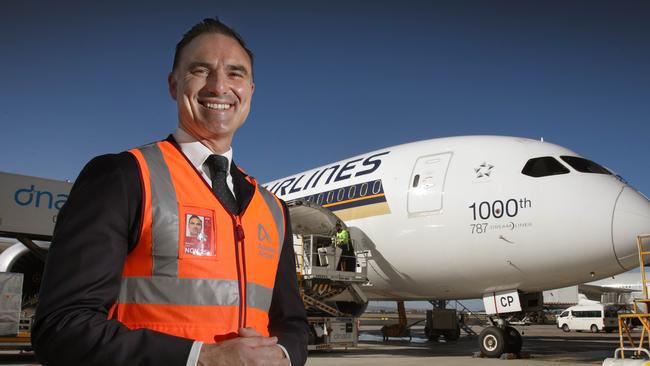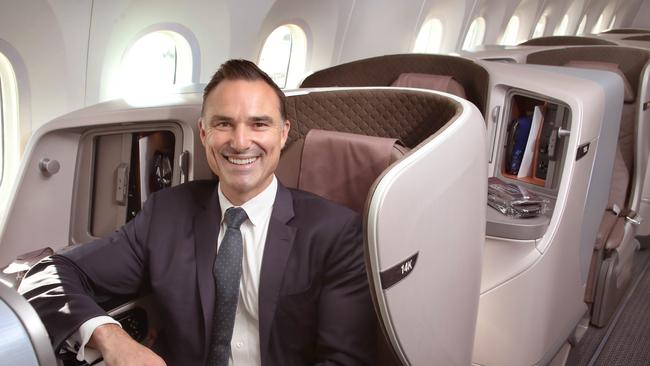Adelaide Airport hits record passenger numbers, but domestic travel softening after Rex exit
Adelaide Airport has welcomed a record number of passengers, but the collapse of Rex Airlines has fuelled calls for a third domestic player to ease prices.

Higher domestic airfares resulting from the collapse of Rex Airlines have put a dent in passenger numbers travelling through Adelaide Airport, fuelling calls from airport boss Brenton Cox for a third carrier to inject competition into the local market.
Domestic and regional passenger volumes through the airport reached a record high 7.6 million in the year to June, before Rex – previously accounting for 5 per cent of the airport’s domestic capacity – entered administration in July.
Administrators are continuing to operate some services to Port Lincoln, Ceduna, Coober Pedy and other regional centres, but flights out of Adelaide to capital cities including Sydney, Melbourne and Brisbane have been suspended.
Adelaide Airport is owed more than $3m by Rex, as administrators search for a buyer to take over all or parts of the business.
Mr Cox said that while domestic and regional passenger numbers increased by 7 per cent to a record high in 2023-24, the growth had slowed in recent months as airfares continued to rise.
“That’s partly because Rex has fallen out of the market – that was 5 per cent of our domestic traffic and that’s quite a lot,” he said.

“It means prices have gone up, and there just aren’t as many planes and seats to fly people around in. The prices inhibit travel a little bit, and Qantas and Virgin just don’t have more aircraft lying around.”
Rex and budget airline Bonza are the latest in a long line of failed attempts to challenge the Qantas-Virgin duopoly that controls Australia’s domestic aviation market.
Mr Cox said that while their business models had come unstuck, he was hopeful more competition would help to bring down prices for Australian travellers.
“History hasn’t been kind to a third carrier … we just haven’t been able to see that third group come and compete, and part of that is the scale of the incumbents,” he said.
“It is always interesting to see models that work elsewhere, and probably none of those that have really tried in the Australian market have quite got that model right. It’ll be interesting to see if someone was to try that ultra low cost, simple, high volume model that’s worked in some other bigger markets.
“We would (like to see a third carrier) if it would contribute, and it would ensure that everyone could still be profitable.
“Jetstar has been great at providing a lower cost offering and making travel a bit more democratic and affordable, and so certainly, to the extent that we’re able to drive volume through price stimulation, that’s something we would be absolutely in favour of.”
According to the latest airport figures, domestic and regional passenger volumes reached 1.9 million in the September quarter, just 1.6 per cent higher than the same time last year.
On the international front, Emirates resumed its Adelaide services in October, while China Southern will recommence flights in and out of Adelaide in December.
That leaves Cathay Pacific as the last international airline yet to revive its Adelaide services following Covid-19, but Mr Cox is hopeful it will return some time next year.
A surge in international travel, supported by an increase in capacity from major carriers including Singapore Airlines and Qatar Airways, lifted international passenger numbers by 37.1 per cent in 2023-24 to 958,000, still slightly behind the airport’s pre-Covid peak of more than 1 million.
The stronger domestic and international volumes helped Adelaide Airport to a 13.4 per cent increase in revenue to $284.6m, with net profit jumping 91 per cent to $83.5m.
In July the airport paid its first dividend since the pandemic, distributing $20.7m to shareholders which include UniSuper, Hostplus and IFM Investors.
Mr Cox said close to $110m had been spent on capital projects in 2023-24 – mainly related to a runway and taxiway overlay project – and it was now ramping up investment in baggage and security upgrades inside the terminal.
He said he was hopeful international fares would begin to ease as major airlines ramped up their services into Adelaide, but high costs and a shortage of aircraft would likely limit the scale of any airline price reductions.
“At the moment there’s a bit of a mismatch between underlying customer demand and the ability of airlines to be able to acquire and deploy the aircraft, and put on that supply,” he said.
“There definitely are higher costs now than there were pre-Covid – costs relating to the cost of labour, the cost of property and land – all of those things contribute to higher cost bases.
“But once we do get some more of that supply into the sky, you have to expect that it’s going to put downward pressure on fares.”






To join the conversation, please log in. Don't have an account? Register
Join the conversation, you are commenting as Logout